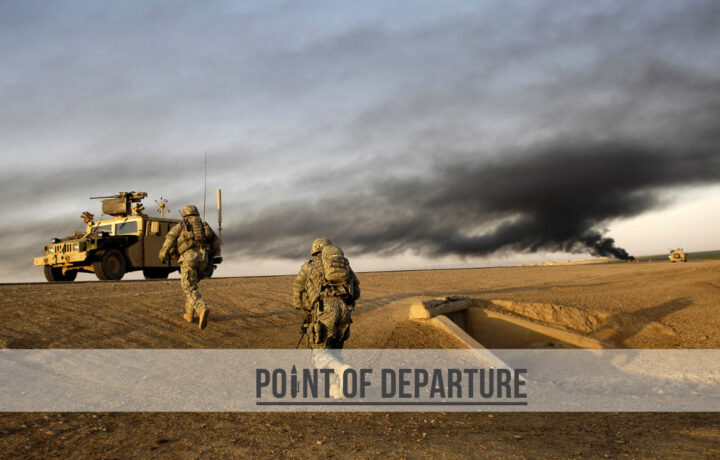It was an otherwise forgettable day in the odyssey we knew as Operation Desert Shield, with a handful of us huddled around a pot-bellied stove with our morning coffee as the late fall skies brought us another deluge of rain. The canvas flap over the entrance to the GP-Medium tent whipped to one side and the battalion commander poked his head in and offered a greeting. Then he looked over at our battalion logistics officer and congratulated him: the promotion list for new captains had just been published by the Army’s personnel command and he was on it. Handshakes and backslaps were offered, and the mood was definitely brighter than it had been a few minutes earlier.
The battalion commander turned to leave, then swung around and looked at me. “Were you supposed to be on this promotion list?”
I wasn’t. I had another year to wait before I would eligible for promotion. But the question itself wasn’t one that should be asked in mixed company, and it certainly wasn’t one that anyone would ever want to hear. It was the kind of question that would make the bottom drop out of your stomach. One that shouldn’t be asked. One for which the answer should already be known so it doesn’t have to be asked.
Answering Hard Questions
Tough questions are just part of life. You never want to respond too quickly or too glibly. You want to take the time to consider an intelligent answer, which goes a long way to preserving your time, credibility, and reputation.
When someone asks you a tough question, listen closely. As simple as that sounds, it allows you to clear the distractions and ensure that you stay focused on the question. Listen deeply; be sure that you’re hearing the question as intended. Then take a moment. Pause to consider the question. Just a few seconds enables you to move from a reactive to proactive response while drawing a deeper mental connection to the question. Repeat the question to the person asking. This serves two distinct purposes: first, it allows the person asking the question to add clarity you might have missed; second, it gives you added time to think through your response. When you respond, be honest. Be sincere. If you’re not, people will sense it. Just be your genuine self and answer the question. Finally, know when to stop. There’s such a thing as too much information. Resist the temptation to add unnecessary detail in the moment.
The 10 Bad Questions
There are hard questions. Then there are questions you never want to be asked. The kinds of questions that make you cringe just hearing them. The kind that are harbingers of doom, because nothing good ever follows the question. Being asked, “Were you supposed to be on this promotion list?” inevitably translates to, “Because you’re not on it.” Depending on the circumstances, that can be potentially career ending and often life changing. Not a casual question you throw out in passing.
Over the years, I kept a short list of these questions in the back of a well-worn green GSA notebook – the kind that you find on every conference table in every meeting. In three decades in uniform, I personally heard every one of them. Every last one of them.
1. Is this your signature?
More often than not, this means you signed something without reading it through. Regardless of what you’re signing, remember to read first, then sign.
2. Did you approve this?
You’re about to get blamed for something, so be ready. That sound you hear is the engine of the bus you’re about to get thrown under.
3. Where is your weapon?
I don’t care who you are or what you do for a living, losing a weapon is deeply personal experience. And if you drop yours into a drum of human excrement, it gets a lot more personal in a hurry.
4. Does this person work for you?
This is never a good thing. No one asks this question because someone did something good. Just brace yourself. It’s going to get worse.
5. Did you mean to hit “reply all”?
We’ve all been there. If you haven’t, you will be one day. And if, like me, you tend to lead with sarcasm, be prepared to pay a price for your stinging wit.
6. Do you have an evaluation due?
Also, never a good thing. Someone who asks this question inevitably intends to write a mediocre report for you. Don’t feel obligated to help them: the answer is always “no.”
7. Did you get paid this month?
Meaning, of course, that you weren’t supposed to be paid this month. Like the previous question, dropping a casual “nope” usually works fine.
8. Are you signed for that?
This question is always asked right before something is taken away from you.
9. Were you expecting a call from CID?
No one ever expects a call from CID. When I got this question, I was relieved to find that they were in search of a weapon that had disappeared in Vietnam and not for all the contraband gear I had locked in the closet in my office.
10. How long has it been since you deployed?
During the heyday of the Forever Wars, this question almost always meant you were about to find yourself on a set of deployment orders. The only acceptable answer was a four-letter word.
Clearly, there are other questions you never want to hear, some of which didn’t make this list. Shortly after returning from the Gulf War, I noticed a brand-new Mustang parked in my next-door neighbor’s driveway. When I saw him pull up in his pickup a couple of days later, I asked what he’d done with the Mustang. The look on his face told me everything I needed to know. And made me regret even asking the question.




